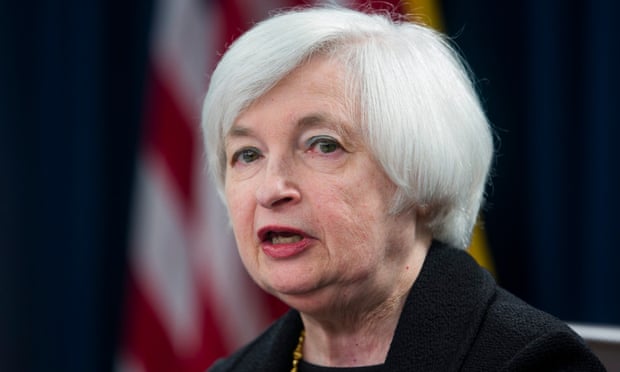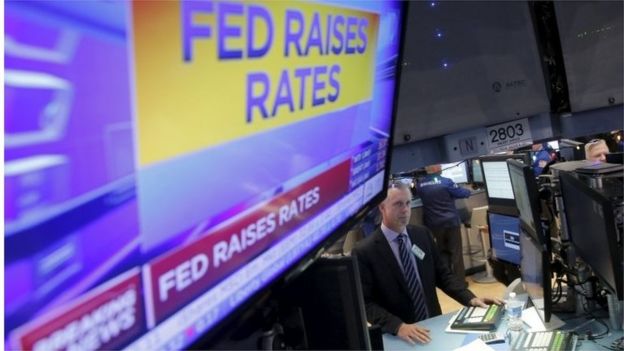
Janet Yellen: "The economic recovery has clearly come a long way"
The US Federal Reserve has raised interest rates by 0.25 percentage points - its first increase since 2006.
The move takes the range of rates banks offer to lend to each other overnight - the Federal Funds rate - to between 0.25% and 0.5%.
The move is likely to cause ripples around the world, and could increase pressure on the UK to raise rates.
It could also mean higher borrowing costs for developing economies, many of which are already seeing slow growth.
Rates in the US have been at near-zero since 2008.
There are concerns that a rise will compound that slowdown, as higher rates in the US could strengthen the dollar, the currency in which many countries and companies borrow.
It puts US policy at odds with that in Europe, where even easier borrowing terms are being implemented.
The European Central Bank earlier this month cut overnight deposit rates from minus 0.2% to minus 0.3% and extended a €60bn stimulus programme.
The Bank of England this month voted to keep rates on hold at 0.5%, with its next move in interest rates not expected until late 2016.
'Improvements'
The US rate rise vote was unanimous.
The US central bank also raised its projection for its economic growth next year slightly, from 2.3% to 2.4%.
That suggests the bank does not think the rate increase will damage growth. US share markets jumped in response.
The Dow Jones went from a 50-point rise to stand up 79 points, and later added to that to close up 224 points at 17,749 points, a 1.3% gain.
It doesn't sound like much - but its significance is mighty.
After nearly a decade of what has been, essentially, a global economic effort - and experiment - to save the world from financial calamity, the Federal Reserve, the central bank to the world's largest economy, has decided, finally, to try a touch of "normalisation".
Getting economies "back to normal" was always the hope during that remarkable time when the financial system was in danger of going bust.
Central banks around the world slashed interest rates to near zero and created billions of pounds of support for governments and the wider economy.
I'm not sure anyone thought that, eight years on, we would still be in a near zero interest rate world. Or, in cases such as the eurozone, a negative interest rate world.
The US central bank cited as the reasons for its action increased household spending and investment by business, along with a continued low rate of inflation.
In its statement, the committee said: "The committee judges that there has been considerable improvements in labor market conditions this year, and it is reasonably confident that inflation will rise, over the medium term, to its 2% objective."
 Image copyrightReuters
Image copyrightReutersThe Fed has said it will continue to monitor inflation and employment to determine if and when further rises are justified.
The chairman of the Federal Reserve, Janet Yellen, said the committee was confident the economy would "continue to strengthen" but it still has "room for improvement".
2017 'normal'
Future action will depend on how the economy moves forward and will be gradual.
Ms Yellen acknowledged weakness remained in the labour market, particularly wage growth.
She warned that if the Fed had continued to delay a rate rise, it could have been forced to tighten monetary policy too quickly, something that could have led to another recession.
The Fed's medium-term projection for the Federal Funds rate is 1.5% in 2016 and 2.5% in 2017.
The Fed will not get close to normal levels of around 3.5% until 2018 when it expects the economy will be back on a solid track: "Were the economy to disappoint, the Federal Funds rate would likely rise more slowly," said Ms Yellen.
She gave little clue as to the timing of the next move, saying: "I'm not going to give you a simple formula for what we need to raise rates again."
At the Fed: Zoe Thomas, business reporter
Tight security at the press conference seemed to add even more gravity to the importance of the announcement about to be made.
Getting stuck at the security desk - while insisting Zoe is your legal name - seemed like a bad omen. In fact it was an opportunity to see Chair Yellen up close in the moments before the announcement, as she walked past.
After every pause by Janet Yellen, reporters' hands shot into the air, eager for answers as to the Fed's thinking. At one point a reporter lifted himself out of his chair.
Most reporters' questions focused on what the Fed would be looking at next. Some bolder reporters though challenged whether the Fed's decision was made out of vanity. One reporter asked if the Fed was raising rates now because its image would be hurt if it did not.
Chair Yellen did not rise to the bait.
Despite that enthusiasm, as the last question was asked, two reporters shared a celebratory bumping of their fists under the desk.
After all, the conference had gone on for more than an hour.
But when Ms Yellen left the room reporters stayed seated, staring at the empty podium as if waiting for another announcement.
UK rate move
UK rates have been held at 0.5% for more than six years.
Although some think the UK's central bank should act sooner than late 2016 to implement a rate rise, the UK business lobby group, the CBI, said it was unlikely to mean swifter action from the Bank of England.
Rain Newton-Smith, the CBI 's director of economics, said: "Alongside the US, the UK has been one of the best-performing advanced economies in recent years, but the Bank of England probably still has a way to go before rising inflationary pressures at home persuade it to follow and up interest rates."
But the Institute of Directors' chief economist, James Sproule, said it would give the Bank of England room to act.
"There will always be a thousand possible excuses not to raise rates, but... we are probably close to peak employment in the UK, with employment growth set to plateau next year," he said.
"All these factors should encourage rate-setters in the UK to think seriously about raising rates in early 2016."
No comments:
Post a Comment